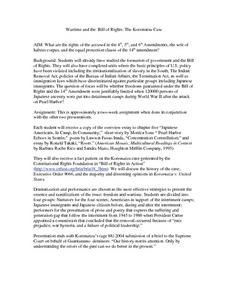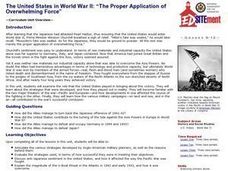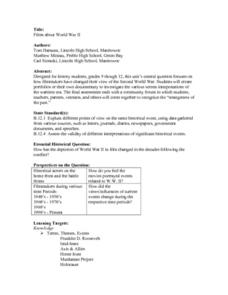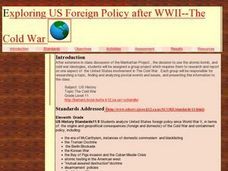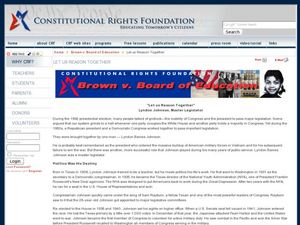Curated OER
Wartime and the Bill of Rights: The Korematsu Case (Lesson 2)
Twelfth graders review how the government and Bill of Rights came into effect. Using primary source documents, they discuss if Japanese rights were violated when they were placed in internment camps after the bombing of Pearl Harbor. ...
Curated OER
Defining Moments-from the past with lessons for a post 9/11 world
Students use the spreadsheet to determine policy options, establish criteria for the solution, weight the criteria in terms of importance and rate the options relative to each criterion to determine a solution to the problem. They...
Curated OER
Japanese Internment and Korematsu v. US
Students study the internment camps and the trials of the Nisei. They compare the post-Pearl Harbor US with post-9/11 US and evaluate the decision of Korematsu v. US. They synthesize the material and write an assent/dissent opinion on...
Curated OER
"I" Witness to History
Young journalists write diary entries from the point of view of a person involved in a historical event. They focus on including facts, clear narration, and accurate description of the individual's feelings.
Utah Education Network (UEN)
Classical Appeals and War Speeches
Discuss classical appeals of rhetoric through the speeches of Winston Churchill and FDR. Learners read, annotate, and analyze the speeches by the men before using a graphic organizer to track the use of ethos, pathos, and logos.
Curated OER
Dr. Seuss Takes on Charles Lindbergh
Students study the leaders of the isolationist movement within the United States and the causes of the isolationist movement, they recognize and compare the perceptions of both the isolationists within the US and those who took a more...
Curated OER
Juan Verdades
Cement comprehension skills using the strategies in this activity. After reading the story, Juan Verdades by Joe Hays, learners use context clues to answer questions, identify main ideas and details, and sequence events.
Curated OER
Farewell to Manzanar
Examine human resilience across two texts with a detailed unit. Over the course of a week, learners will conduct a close reading of excerpts from Unbroken and Farewell to Manzanar. The resource includes clear procedures for reading and...
School Improvement in Maryland
Executive Order
After reading information about Executive Order #9066, class members assume the voice of an 18 year-old Japanese-American born in California and placed in an internment camp. Individuals then craft a letter to President Roosevelt...
Stanford University
Japanese American Incarceration
Using documents, such as reports from government sources and civil rights activists, budding historians explore the justification for forcing hundreds of thousands of Japanese-Americans to leave their lives and re-evaluate that tragic...
Curated OER
"The Proper Application of Overwhelming Force": The United States in World War II
Young scholars examine the role that the U.S. played in bringing about victory in the two major theaters of the war in the Pacific and Europe. How the various military campaigns contributed to the war's successful conclusion forms the...
Curated OER
Turning the Tide in the Pacific, 1941-1943
High schoolers explore the overall strategies pursued by the Japanese and the Allies in the initial months of World War II. What each side hoped to accomplish what what actually happened forms the basis of a comparison made in this lesson.
Curated OER
Turning the Tide in Europe, 1942-1944
Students explore the overall strategies pursued by the Americans and their British allies in the initial months of World War II in Europe. By examining military documents, students examine the decision to invade North Africa instead of...
National Endowment for the Humanities
How to Win a World War
High schoolers are have begun to learn the art of diplomacy with each other, but do they understand how diplomacy works at a global level? The second in a series of four lessons, guides scholars in evaluating primary sources. The why...
Curated OER
Films About World War II
Ninth graders focus on how filmmakers have changed their view of the Second World War. They create portfolios or their own documentary to investigate the various screen interpretations of the wartime era and explain different points of...
Curated OER
Exploring US Foreign Policy after WWII--The Cold War
Scholars explore U.S. Foreign Policy and Cold War ideologies adopted after WWII. They conduct Internet research on a topic or issue related to the Cold War Era, watch two films, and compose a time line and a multimedia presentation to...
Curated OER
Tejana Military Members in World War II
Seventh graders discover who the Tejanas were and how they contributed to World War II. In this World War II lesson, 7th graders listen to their instructor discuss who the Tejanas were prior to researching the contributions of three of...
Curated OER
My Secret War: Lesson 5
Fifth graders determine how freedom comes with rights and responsibilities through literature and poetry about World War II. For this World War II lesson, 5th graders use the letters in the word "infamy" to write an acrostic poem. They...
Curated OER
Why do wars occur?
Understanding the causes of war is one way (possibly) to prevent it. World War II is used as a case study to facilitate an understanding of reasons why wars start. Topics covered included Totalitarianism, scarcity of resources, need for...
Constitutional Rights Foundation
The Cold War: How Did It Start? How Did It End?
What is the difference between a Cold War and a Hot War? Scholars research the beginning of the Cold War. They analyze diary entries as well as excerpts from various events during the 45-year standoff. To finish, they prepare final...
Scholastic
The Rise of Railroads: California
Railways are an integral part of the history of California. Using a timeline format, class members connect major historical events to the rise of the railroads and their impact on the state. Activities include a mix of independent and...
Scholastic
The Rise of Railroads: Illinois
Railways not only cross the US, but they are also intertwined with the history of America. Using a timeline format, individuals explore the connections between major events in American history—such as the Civil War—and the rise of the...
Curated OER
Vocab-u-lous! Build a Fabulous Vocab
In this vocabulary worksheet, students select the best word choice to complete the sentence. All words correspond to the theme of Presidents' Day.
Curated OER
"Let us Reason Together" Lyndon Johnson, Master Legislator
Students explore the contributions of Lyndon B. Johnson. In this congress lesson, students listen to their instructor lecture on the prowess of Lyndon B. Johnson's legislative skills. Students respond to discussion questions connected to...
Other popular searches
- Pearl Harbor Wwii
- Attack on Pearl Harbor
- Pearl Harbor Map
- Pearl Harbor Day
- Pearl Harbor Attack
- Social Studies, Pearl Harbor
- Pearl Harbor Lesson Plans
- Pearl Harbor Movie
- Pearl Harbor Crossword
- Pearl Harbor Crossword Puzzle
- Wwii Pearl Harbor Movie
- Bombing of Pearl Harbor


